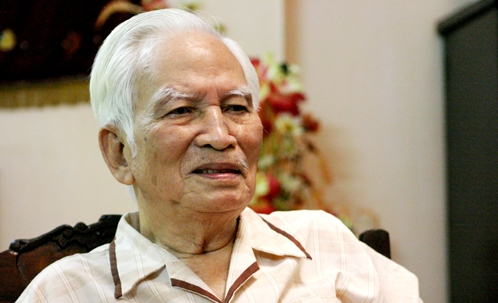
As for the teacher, when we first met him, everyone thought he was an artist. I still remember an unforgettable memory in my university life: at that time, the Faculty of Literature had just moved from the evacuation area (La Khe village, Ha Dong) to Me Tri area (on Luong The Vinh street now), the class of Vietnamese Literature after the August Revolution of 1945, he taught the last 3 periods, a lecture on resistance poetry 1946 - 1954. It was 11 o'clock, almost the end of class. Students from Me Tri dormitory went down to the communal kitchen, many people walked and tapped their spoons on their bowls. Suddenly, many students from the Faculty of History stopped by the window of the third-year Literature classroom. Teacher Hoang Nhu Mai was teaching the poemWestern Advanceby Quang Dung. The teacher's voice was deep and deep, sometimes eloquent, sometimes passionate, emotional and profound. Both teacher and student forgot tiredness, forgot hunger, forgot the time passing quickly at the last minute, the last hour of class. After reading and commenting on the last verse of the poem, the teacher's two hands were still raised like a conductor setting the rhythm of a song. Then suddenly burst out, then exclaimed, then rejoiced in the group of students. That day in the kitchen of Me Tri Dormitory, students of the two faculties of Literature and History lingered around the tables that had been cleared away, they were engrossed in commenting on the wonderful lecture of teacher Hoang Nhu Mai.
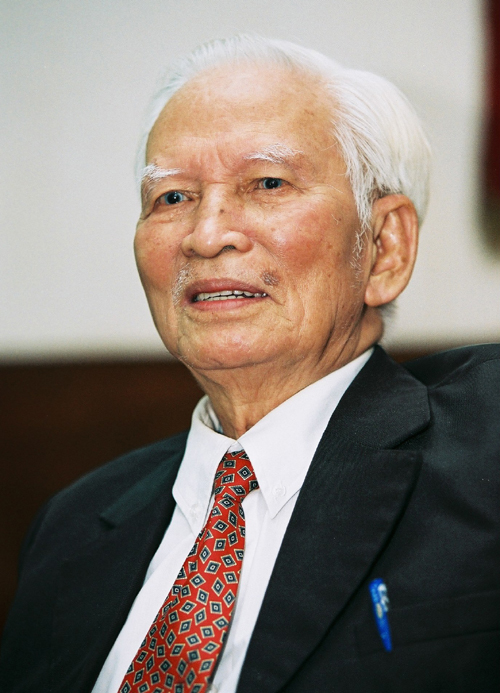
Professor, People's Teacher Hoang Nhu Mai (1919-2013)
Professor Hoang Nhu Mai lived through the 20th century - a century full of memorable, heroic and generous events - through the period of renovation and entered the first decade of the 21st century with new opportunities for the whole nation and each Vietnamese person. Having lived a lot, experienced and felt a lot, he is therefore elegant and self-possessed, plus he has an innate artistic quality, so he is generous and generous. When meeting him, the first feeling is trust, sympathy and sharing. As one of his students, I see him as a person who shines in many fields: training, research, cultural and social activities.
First of all, Mr. Hoang Nhu Mai is a true teacher. He entered the teaching profession at the age of 29 (1948) with more than 50 years of pursuing and dedicating himself wholeheartedly to the cause of "cultivating people". In August 1948, the Viet Minh Provincial Committee of Thai Binh province decided to establish a private specialized school to accept local students and students from other places who had evacuated to Thai Binh (at that time the province had not been occupied by the French army). Most of the teachers at the school at that time were intellectuals and artists, so the organization wanted to find someone with practical teaching and cultural and social activities to be the Principal. Hoang Nhu Mai was nominated as the Principal of Phan Thanh School from September 1948 to early 1950. At the beginning of this year, the French army occupied Thai Binh province, so Phan Thanh School could not operate, some students evacuated to other places, some volunteered to join the army and guerrillas. After this event, he went to Viet Bac and accepted a job at the Ministry of National Education (at that time located in Phu Tho). At first, he worked in the professional department (room 3), then was appointed as Secretary of the Tu Thu Camp. In September 1950, the Ministry of National Education established a Pedagogical School (located in Bac Thai province), named Viet Bac Pedagogical School (primary level), once again, he was mobilized by the Ministry of National Education to teach and then appointed as Principal. After the Border victory (1950), the Ministry of National Education moved several Pedagogical Schools to a new location, named Vietnam Campus (located in Nanning, Guangxi, China). In 1953, the Pedagogical schools in the Vietnam Campus were reorganized into 3 schools: the Advanced Pedagogical School (training high school teachers), the Intermediate Social Pedagogical School (training secondary school teachers of social sciences) and the Intermediate Natural Pedagogical School (training secondary school teachers of natural sciences). Mr. Hoang Nhu Mai was appointed as the Principal of the Intermediate Social Pedagogical School.
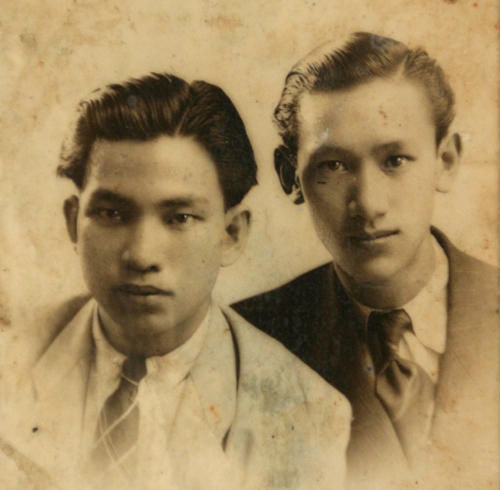
Professor Hoang Nhu Mai in his youth (left)
Those who have the opportunity to be close to and understand him will respect and admire him as an artist and a cultural and social activist. After passing the Baccalaureate in Philosophy in 1939, he entered the College of Medicine for a year and then transferred to the College of Law but did not take the exam to get a degree but continued to self-study, write articles and books. Such behavior, before the August Revolution (1945), was often seen in people of the "romantic" and "artist" model, and was not rare. Mr. Hoang Nhu Mai joined the National Language Propagation Association and was active in the Youth Movement in Hai Duong province (September 1943 - March 1945). He participated in the General Uprising in Hanoi, and was present at the historic rally on September 2, 1945, at Ba Dinh Square among intellectuals and artists. In April 1946, he joined the army to go to the South, working in the field of culture and arts: with friends, he founded a propaganda drama troupe, named Doc Lap Drama Troupe. (Operating license issued by Minister of Information and Propaganda Tran Huy Lieu). Doc Lap Drama Troupe opened in Hue and continued to tour in the provinces and towns of the South Central region. The plays of Doc Lap Drama Troupe attracted many viewers because of their patriotic content, with the enthusiastic performance of non-professional actors, in which he contributed. In mid-1947, Mr. Hoang Nhu Mai participated in the movement to establish the Resistance Cultural Association of Hung Yen province, taking on the position of General Secretary and in charge of the drama troupe named Resistance Cultural Drama Troupe (of Hung Yen province). During this time, he composed a number of plays such asThe sound of the drum of Ha Hoi(about the great attack and defeat of the Qing army by the cloth-clothed hero Quang Trung - Nguyen Hue);Kill(about the resistance war against the Yuan-Mongol army);The prisoner(about the resistance war against France)...
After the historic victory of Dien Bien Phu (1954) and the takeover of the Capital (October 1954), the Pedagogical schools in the Vietnam Campus moved from China to Hanoi. At this time, the two Secondary Pedagogical Schools of Natural Sciences and Social Sciences were merged into the Central Secondary Pedagogical School (training secondary school teachers). Mr. Hoang Nhu Mai was appointed as Vice Principal and then Principal from 1956 to 1959. From 1959, he was transferred to work as a teaching staff at Hanoi Pedagogical University and Hanoi University of Science, until the two schools were separated, he taught at the Faculty of Philology, Hanoi University of Science (1960 - 1980).
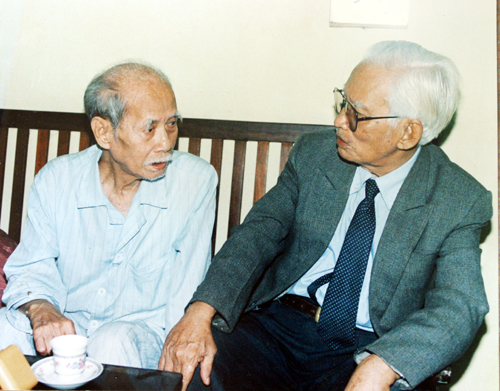
Professor Truong Tuu and Professor Hoang Nhu Mai
Since this time, Professor Hoang Nhu Mai, in addition to teaching at the university, has also been involved in cultural and social activities: he is a member of the Hanoi City Fatherland Front (2 terms), an active collaborator of the Voice of Vietnam Radio, CP-90 Radio (of the National Liberation Front of South Vietnam - Provisional Government of the Republic of South Vietnam), specializing in writing about cultural and social issues. He is also a literary speaker for clubs in Hanoi and several provinces. His literary and artistic talks often have a large audience. I know that in this field, at that time, there were only a few "champions" such as Hoai Thanh, Xuan Dieu, Hoang Nhu Mai, Ha Minh Duc, Phan Cu De. Because as people say, one must have "speaking skills", must be "good at speaking". But the cultural foundation is decisive, especially when speaking in front of a crowd that is always difficult and intelligent (like the members of the Thang Long club, for example).
Since 1980, he moved to live and work in Ho Chi Minh City. In addition to teaching at the Faculty of Language and Literature, Ho Chi Minh City University of Science, although he is over 60 years old, he is still full of enthusiasm for the cause of culture - society - education. With his prestige, he was elected as the President of the Ho Chi Minh City Literature Research and Teaching Association (4 terms). He has an extraordinary working capacity in many different jobs: Member of the Ho Chi Minh City Fatherland Front (3 terms), Member of the Ho Chi Minh City Social Science Council (since its establishment), Member of the Executive Committee of the Ho Chi Minh City Union of Science and Technology Associations (3 terms), Member of the Executive Committee of the Ho Chi Minh City Association for Promotion of Education (2 terms).
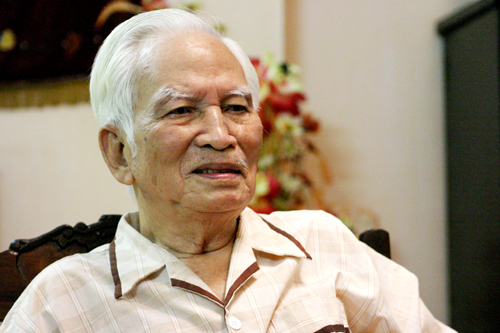
Mr. Hoang Nhu Mai retired in 1990. Retired but not retired from work. People working in the cultural - social sectors and education sector of the city named after Uncle Ho often meet an old man who, even though he is 70, then 80 years old, is still "fighting" on many fronts. He was invited to be the Honorary Principal of Van Hien University and the Principal of Truong Vinh Ky Private High School in Ho Chi Minh City. Although he has lived in the sunny and windy Southern city for 26 years, the city known as the "Pearl of the Far East", Mr. Hoang Nhu Mai still has "a place to return to" Hanoi. Living in Ho Chi Minh City, his soul is always ""Missing the twelve"like the mindset of writer Vu Bang, who once had fascinating masterpieces about the capital Hanoi. Occasionally having the opportunity to return to the “old place”, the teacher still creates opportunities to meet colleagues, friends, and students from the past here. Many old memories come flooding back, making both students and teachers nostalgic and emotional…
Loving life, loving people, loving work and being calm and at ease while doing your best - that's what I and the next generation learned a lot from Mr. Hoang Nhu Mai.""For the ten-year career of planting trees, for the hundred-year career of educating people"Uncle Ho's teachings are carried out wholeheartedly by tens of thousands of teachers. Among the large number of people working in the "human cultivation" profession, Mr. Hoang Nhu Mai is one of them.
|
PROFESSOR, PEOPLE'S TEACHER HOANG NHU MAI
+ Working unit: Faculty of Literature, Hanoi National University.
Principal of Phan Thanh Private School (1948). Principal of Viet Bac Pedagogical School (1951). Principal of Central Pedagogical College (1953). Principal of Truong Vinh Ky High School (1997). President of the Association for Research and Teaching of Literature (from 1988 until his death).
Modern Vietnamese Literature,Education Publishing House, Hanoi, 1961. Playwright - Cai Luong actor Tran Huu Trang, Theatre Publishing House, co-written, 1968. Introduction to Cai Luong stage, Theatre Publishing House, co-written, 1986. Memories and thoughts on educational culture, 1998. Hoang Nhu Mai's selected works, Education Publishing House, Hanoi, 2005. |
Author:Bui Viet Thang
Newer news
Older news